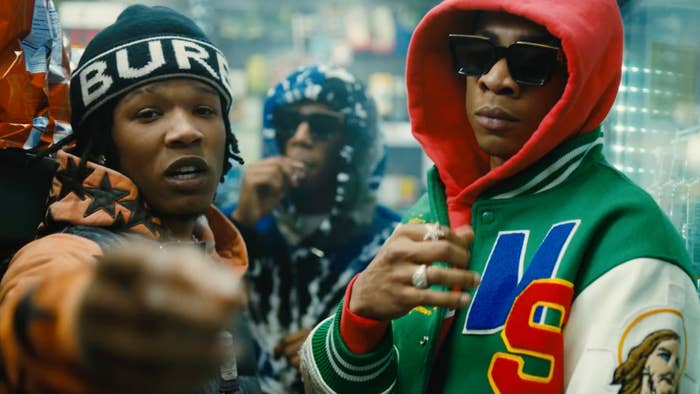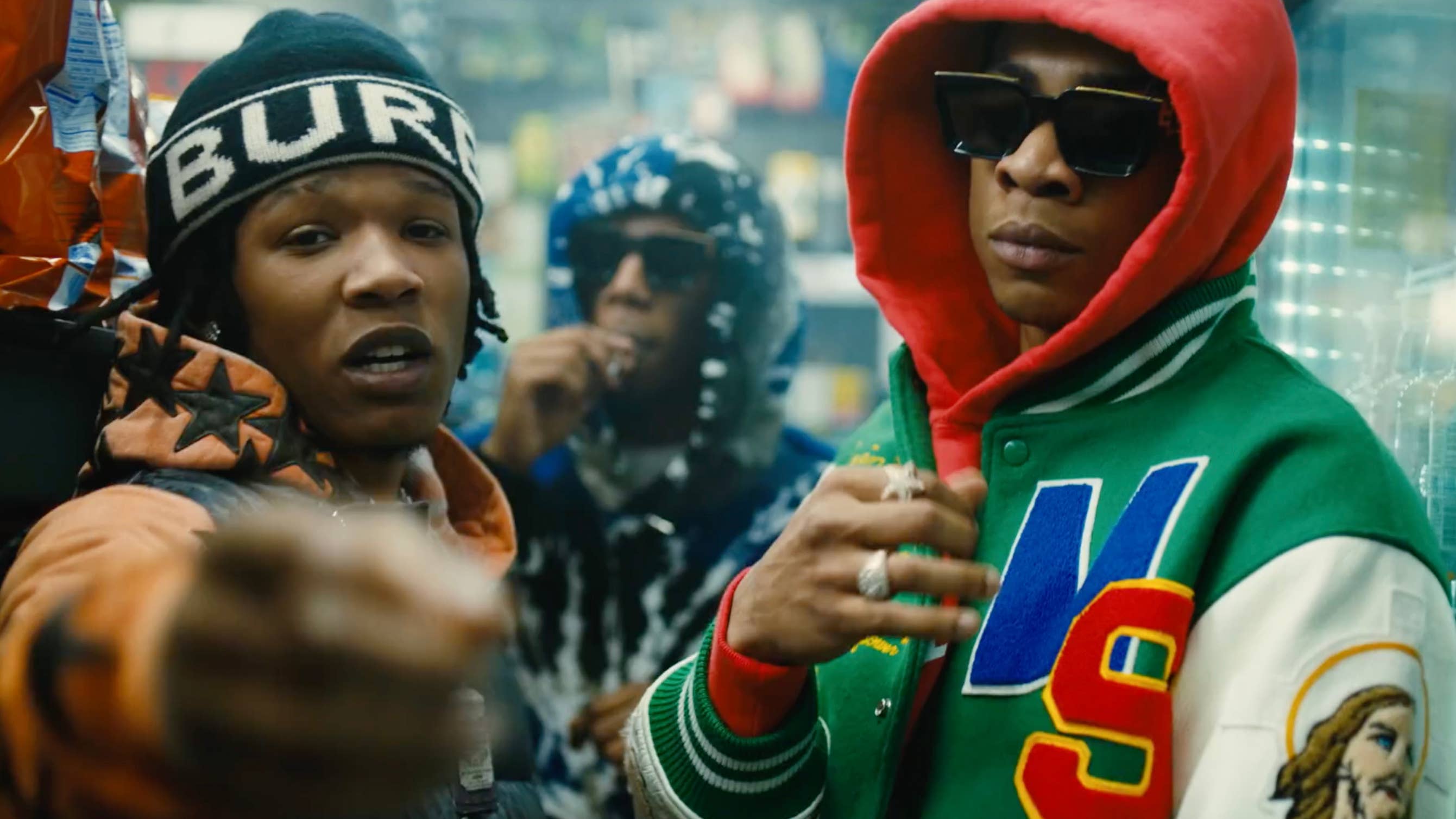
The New York rap scene has a new formula that’s making songs go viral every day.
The art of taking a classic song and transmuting it to fit a new era through sampling has been a staple in hip-hop production for decades, but now the New York drill scene is experiencing its own sample renaissance. We’ve entered the sample drill era.
Sample drill is a subsect of New York drill, and it’s been bubbling over the last two years. As the name suggests, the subgenre pairs classic samples with New York drill’s signature bass-heavy production, to create a nostalgic-yet-modern sound. By flipping easily recognizable hits, like Lauryn Hill’s “Ex-Factor” or James Brown’s “Georgia on My Mind,” the songs are digestible and catchy, with plenty of viral appeal. TikTok has played a big role in the explosion of sample drill, with many tracks being used as the soundtrack for viral trends, and now the movement has caught the attention of mainstream stars like Cardi B, who jumped on the remix for fellow Bronx rapper Kay Flock’s sample drill song “Shake It.”
Young drill artists like Kay Flock, B-Lovee, Shawny Binladen, and more have been pivotal in pushing sample drill forward over the last few years. One of the biggest songs that have emerged from the scene thus far is B-Lovee’s “My Everything.” Produced by Cash Cobain, the song samples Mary J. Blige’s “Everything,” and it’s been used over 400,000 times on TikTok and has garnered two remixes featuring A Boogie and G Herbo.
Explaining how he gained a deep understanding of the throwback music that he samples, Cash Cobain tells Complex, “I grew up with my mother, my grandmother, my whole family. We all love music, so I just know music from when they were young. That’s [music] from the ‘60s, ‘70s, ‘80s, I know all of that shit. All of that music was embedded into me, so when it’s time to make songs, I already know this shit.”
Sample has become one of the most popular music movements coming out of New York City, and there’s a high ceiling on its future, with a group of impressive young artists leading the way. Here’s a crash course on the bubbling subgenre.
What is sample drill?
View this video on YouTube
Sample drill, which is sometimes referred to as Bronx drill, is an evolution of the Brooklyn drill sound. It relies on the sampling of classic R&B, pop, and rap records, and pairing them with drill production staples: gliding bass and emphatic snares. On the surface, it’s a simple formula—loop the chorus of “Dilemma” and put some drill drums behind it, and you have an extremely catchy new song (with a gritty, menacing edge).
The sound was influenced by Brooklyn drill artists like Pop Smoke, but producers like Cash Cobain wanted to put their own spin on the existing drill movement that was already popular in the city. “The [Brooklyn] drill wave came, Pop Smoke and all of them,” Cash explains. “It was cool, I like 808 Melo, but we realized that everybody wants to do this shit, so we had to do it in a different way. I wanted to figure out my own way to do this. My shit not going to sound like everybody else. I heard a sample, and knew I wanted to add my own drill shit to it… A lot of other producers picked up on that shit, too.”
Where did it originate?
View this video on YouTube
Although it was influenced by Brooklyn drill, much of the sample drill movement originated in Brooklyn’s neighboring boroughs of the Bronx, Queens, and Harlem. The sound has been spreading, but the Bronx is still the predominant borough for sample drill. Bronx drill distinguishes itself from its Brooklyn counterpart, not just with its production, but also in how the rappers perform. “The difference between Bronx drill and Brooklyn drill is, when Pop Smoke came, he made that shit more swaggy,” Cash Cobain explains. “He had a different approach to it. It was calmer. These little kids from the Bronx are wild. They on demon time. They’re angrier with their shit.”
Over time, the subgenre has moved to other areas, even leaking into the tri-state area over the last few months, with New Jersey producers taking samples and mixing them into their own Jersey club beats, which have clear connections to what’s happening across the river. As it goes mainstream, the sound will likely spread even further.
Who are some of the key players?
View this video on YouTube
There are many artists pushing the sample drill wave forward. Kay Flock, B-Lovee, Big Yaya, Shawny Binladen, Dougie B, Sleepy Hallow, Kenzo B, Sha Ek, and Curly Savv are just a few of the artists occupying the space. Among them, Flock, Hallow, Lovee, Yaya, and Binladen are some of the biggest artists in the sample drill scene right now.
Flock and Lovee are both from the South Bronx, while Big Yaya and Shawny are from Queens. Yaya and Shawny are also members of Yellow Tape Boyz, a collective of young drill rappers and producers making a name for themselves out of Queens. Brooklyn’s Sleepy Hallow had one of the early viral sample drill songs with his “Deep End Freestyle,” which made waves on TikTok due to its sample of Fousheé’s “Be Kind To Your Ears.” While Flock, Lovee, Yaya, and Shawny are all technically New York drill rappers, they each use different kinds of samples and lean into unique flows to separate themselves. For example, Shawny’s whisper-rap sounds different from B-Lovee’s more gravelly voice, while Kay Flock’s booming delivery makes him stand out. Most of these artists got their start by dropping a lot of music that initially wasn’t even on DSPs, but you can now find much of their catalogs on streaming services.
Cash Cobain is one of the producers leading the way for the sound. The self-proclaimed “Sample God” says the reason he’s able to stay ahead of the trend is by looking for samples anywhere. “My mom could be playing music upstairs, and I’m going to sample it,” he explains. “I could be watching a movie in the background and hear something pop off, and I’m sampling that. I could be outside at a restaurant and hear a song that I don’t even know, and I’ll pull out my phone and Shazam that shit so I can sample it when I get home.”
Why is it getting so popular?
View this video on YouTube
The obvious explanation for sample drill’s explosion in popularity is the power of sampling. Generally, people like things they already know, and soul samples are somewhat of a cheat code in rap. Mainstream artists like Saweetie have found massive success from flipping nostalgic records, but New York sample drill has a different feel to it. What makes the subgenre unique is the visceral, menacing nature of the songs. Songs with samples often sound glossy and expensive, but sample drill reflects the gritty heart and soul of New York City. Many of the biggest records play up the appealing contrast of hearing hard-hitting, aggressive raps over catchy, soulful samples.
TikTok has played an important role in the subgenre’s success. B-Lovee’s song “My Everything,” for example, has been used in over 468,000 videos on the platform. Sleepy Hallow’s “Deep End Freestyle,” one of the earliest sample drill hits, borrows Fousheé’s “Deep End” that was already doing numbers on the app. “Deep End Freestyle” was sent to the stratosphere because of it, going viral and spawning dance challenges. While the social media app has been integral in helping sample drill reach a larger audience outside of New York City, Cash clarifies that the artists and producers are not making songs for TikTok. “It’s never premeditated,” he says. “When ‘My Everything’ [went viral], I didn’t know that shit would happen. I don’t be on TikTok. I be on Instagram, so I didn’t even know what was happening… but I would never make some shit for TikTok.”
Are these samples getting cleared?
View this video on YouTube
The short answer is… kind of. Usually, it’s very difficult (and expensive) to clear samples that come from classic songs or A-list artists. It seems that sample drill rappers and producers take a loose approach when it comes to clearing samples on their smaller songs, though. Many of them have a goal to put the songs out in the world, and then figure out the clearances later. According to Cash, he’s mainly concerned with clearing the songs that go viral. “These samples are getting cleared,” he says with a laugh. “The big ones? They’re getting cleared. [A lot of people] don’t know that, but the big ones are getting cleared. But for the most part, they’re not getting cleared. The ones that are the most commercialized are definitely getting cleared, but the ones that are just on YouTube, they not cleared.” “My Everything,” for example, is cleared, and he isn’t as worried about doing the work to clear his less popular tracks.
Where does it go from here?
View this video on YouTube
The subgenre has a lot of momentum right now. With a Cardi B co-sign and a stranglehold on TikTok, it’s only a matter of time until other big artists tap into the scene and help it reach another level, similar to what Drake did two summers ago when he put a Brooklyn drill song on Dark Lane Demo Tapes. What happens after that is where things get interesting.
“I feel like it’s going to go commercial,” Cash Cobain says. “I feel like a lot of people are going to tap in, and this summer is going to go crazy. I don’t know how everyone else is going to evolve, but I know I’m going to evolve. Shit’s going to go crazy, but there’s always going to be another wave that’s going to come.”
An example of the kind of sample drill that’s “gone commercial” can be found on Fivio Foreign’s new album. Fivio sampled Destiny Child’s “Say My Name” on B.I.B.L.E., but as Cobain explains, it didn’t have that Bronx grit that makes sample drill distinct. “The sound of it is too polished,” Cash says. “There was nothing gritty about the shit. It’s like TikTok [music]. The beats were fire, but he didn’t get them shits from Cash.” Producers like Cash are why sample drill has an industrial flair that separates it from the rest of the drill scene.
The commercialization of sample drill seems inevitable, and Cash Cobain is coming to peace with that. “Everything comes to an end,” he says. “It was our time for the sample drill, and this shit is going to come and go. I hate when shit gets oversaturated and commercialized, too, but what else are we doing this for? Are we doing this to keep it to ourselves, or give it to the world? It’s a bittersweet moment.”


![Sample drill, which is sometimes referred to as Bronx drill, is an evolution of the Brooklyn drill sound. It relies on the sampling of classic R&B, pop, and rap records, and pairing them with drill production staples: gliding bass and emphatic snares. On the surface, it’s a simple formula—loop the chorus of “Dilemma” and put some drill drums behind it, and you have an extremely catchy new song (with a gritty, menacing edge).
The sound was influenced by Brooklyn drill artists like Pop Smoke, but producers like Cash Cobain wanted to put their own spin on the existing drill movement that was already popular in the city. “The [Brooklyn] drill wave came, Pop Smoke and all of them,” Cash explains. “It was cool, I like 808 Melo, but we realized that everybody wants to do this shit, so we had to do it in a different way. I wanted to figure out my own way to do this. My shit not going to sound like everybody else. I heard a sample, and knew I wanted to add my own drill shit to it… A lot of other producers picked up on that shit, too.”](https://img.youtube.com/vi/L7P68k8jWbI/mqdefault.jpg)


![The obvious explanation for sample drill’s explosion in popularity is the power of sampling. Generally, people like things they already know, and soul samples are somewhat of a cheat code in rap. Mainstream artists like Saweetie have found massive success from flipping nostalgic records, but New York sample drill has a different feel to it. What makes the subgenre unique is the visceral, menacing nature of the songs. Songs with samples often sound glossy and expensive, but sample drill reflects the gritty heart and soul of New York City. Many of the biggest records play up the appealing contrast of hearing hard-hitting, aggressive raps over catchy, soulful samples.
TikTok has played an important role in the subgenre’s success. B-Lovee’s song “My Everything,” for example, has been used in over 468,000 videos on the platform. Sleepy Hallow’s “Deep End Freestyle,” one of the earliest sample drill hits, borrows Fousheé’s “Deep End” that was already doing numbers on the app. “Deep End Freestyle” was sent to the stratosphere because of it, going viral and spawning dance challenges. While the social media app has been integral in helping sample drill reach a larger audience outside of New York City, Cash clarifies that the artists and producers are not making songs for TikTok. “It’s never premeditated,” he says. “When ‘My Everything’ [went viral], I didn’t know that shit would happen. I don’t be on TikTok. I be on Instagram, so I didn’t even know what was happening… but I would never make some shit for TikTok.”](https://img.youtube.com/vi/mJ6iYgHklNY/mqdefault.jpg)
![The short answer is… kind of. Usually, it’s very difficult (and expensive) to clear samples that come from classic songs or A-list artists. It seems that sample drill rappers and producers take a loose approach when it comes to clearing samples on their smaller songs, though. Many of them have a goal to put the songs out in the world, and then figure out the clearances later. According to Cash, he’s mainly concerned with clearing the songs that go viral. “These samples are getting cleared,” he says with a laugh. “The big ones? They’re getting cleared. [A lot of people] don’t know that, but the big ones are getting cleared. But for the most part, they’re not getting cleared. The ones that are the most commercialized are definitely getting cleared, but the ones that are just on YouTube, they not cleared.” “My Everything,” for example, is cleared, and he isn’t as worried about doing the work to clear his less popular tracks.](https://img.youtube.com/vi/EIWD1LEK1qs/mqdefault.jpg)
![The subgenre has a lot of momentum right now. With a Cardi B co-sign and a stranglehold on TikTok, it’s only a matter of time until other big artists tap into the scene and help it reach another level, similar to what Drake did two summers ago when he put a Brooklyn drill song on Dark Lane Demo Tapes. What happens after that is where things get interesting.
“I feel like it’s going to go commercial,” Cash Cobain says. “I feel like a lot of people are going to tap in, and this summer is going to go crazy. I don’t know how everyone else is going to evolve, but I know I’m going to evolve. Shit’s going to go crazy, but there’s always going to be another wave that’s going to come.”
An example of the kind of sample drill that’s “gone commercial” can be found on Fivio Foreign’s new album. Fivio sampled Destiny Child’s “Say My Name” on B.I.B.L.E., but as Cobain explains, it didn’t have that Bronx grit that makes sample drill distinct. “The sound of it is too polished,” Cash says. “There was nothing gritty about the shit. It’s like TikTok [music]. The beats were fire, but he didn’t get them shits from Cash.” Producers like Cash are why sample drill has an industrial flair that separates it from the rest of the drill scene.
The commercialization of sample drill seems inevitable, and Cash Cobain is coming to peace with that. “Everything comes to an end,” he says. “It was our time for the sample drill, and this shit is going to come and go. I hate when shit gets oversaturated and commercialized, too, but what else are we doing this for? Are we doing this to keep it to ourselves, or give it to the world? It’s a bittersweet moment.”](https://img.youtube.com/vi/2e_EJwiL77s/mqdefault.jpg)